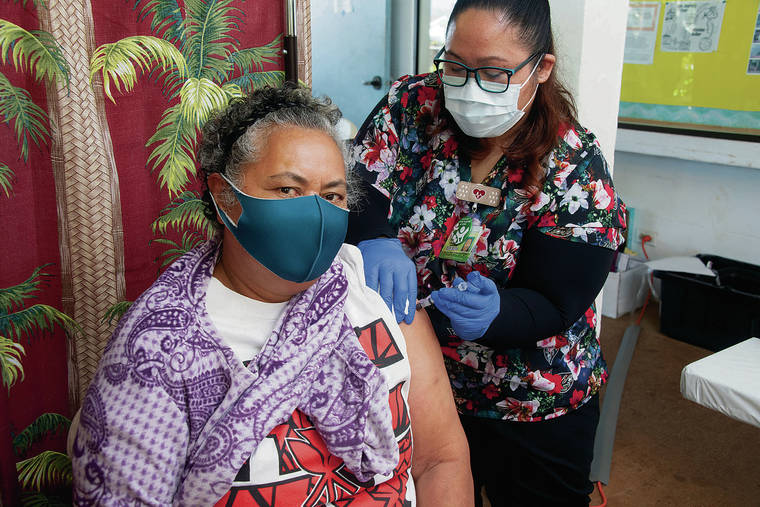Vaccination clinic targets Tongans, immigrant farmers

CRAIG T. KOJIMA / CKOJIMA@STARADVERTISER.COM
A COVID-19 vaccination clinic was held at Trinity United Methodist Church in Pearl City to serve two underserved groups in the community: Tongan elders and Southeast Asian immigrant farmers. Mata Manuopangai received a vaccination shot from Jomelyn Marcelino on Saturday.
Dozens of Tongan elders and Southeast Asian immigrant farmers — both underserved communities — were vaccinated against the coronavirus Saturday at Trinity United Methodist Church in Pearl City.
Kalihi Palama Health Center staff set up a handful of vaccination stations for the event, providing medical checkups before administering a first dose of the Moderna vaccine free of charge.
The makeshift clinic, hosted by the church and the state-initiated Interagency Council for Immigrant and Refugee Services, made translators available for Tongan, Laotian, Burmese and Thai participants who might have questions about the vaccine. About 60 people altogether were scheduled to receive a shot.
“We really wanted to reach out to the harder-to-reach populations … so that they understand our entire vaccination rollout process,” said Terrina Wong, interim deputy director and director for immigration services at the nonprofit Pacific Gateway Center, which helps low- income residents, immigrants, refugees and other vulnerable populations become self-sufficient.
Along with the Interagency Council, the center is part of an advisory group that assists the state Department of Health’s Office of Language Access.
About half of those vaccinated at the church were elderly Tongan residents. The Rev. Ongo Koli said that initially there was hesitation among the church’s Tongan congregation when he reached out to members about the clinic.
Don't miss out on what's happening!
Stay in touch with breaking news, as it happens, conveniently in your email inbox. It's FREE!
“There was pushback from the elders. They wanted to wait and see,” Koli said. “Apparently they heard through social media and other sources that the shot was dangerous. And it got them scared.”
The Trinity UMC pastor said the outreach helped persuade many churchgoers to get the vaccine or at least dispelled some of the misinformation about it.
The Department of Health last week reported that Native Hawaiians and Pacific islanders represent more than 40% of the COVID-19 cases in Hawaii Opens in a new tab, yet less than 9% of that demographic has been vaccinated. Reasons for the disparities include socioeconomic and cultural factors, as well as issues with transportation, language and access to information and the internet.
Koli’s first cousin, Moala Guttenbeil, was with her father, Solomone Halaeua, at the church on Saturday. Halaeua, who turns 83 on Monday, initially refused to get the vaccine. Guttenbeil said he was wary of its possible side effects but became more accepting with Koli’s encouragement.
Phirom Krinsoongnoen, 55, a Kunia farmer who immigrated to the U.S. from Thailand, said he had no qualms about getting himself and his family vaccinated.
“(I) never hesitate. I just want to get vaccinated. I want to be safe,” he said through an interpreter.
He just didn’t know how to get it. So he called the Pacific Gateway Center seeking information and was able to get an appointment for Saturday’s clinic.
Getting more people vaccinated, especially those in vulnerable and higher-risk populations, is a “race against time,” according to Dr. Michael Walter, a pediatrician and medical director for Kalihi Palama Health Center. “We know numbers are going up in the state and nationwide. At our clinic … this week we’ve seen a little jump in cases,” he said.
Meanwhile, Department of Health officials on Saturday reported one new coronavirus-related death on Maui and 87 infections, bringing the state’s totals since the start of the pandemic to 453 fatalities and 28,694 cases. The new cases include 55 on Oahu, 22 on Maui, nine on Hawaii island and one Hawaii resident diagnosed outside the state.




